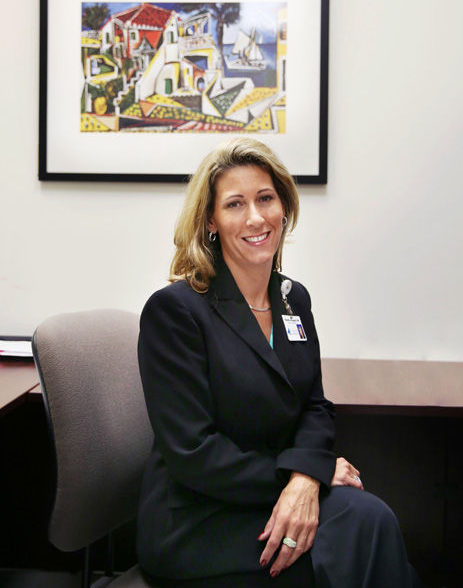
Home health care is widely recognized as a vital aspect of general medical care. As technology and resources advance, hospital stays become shorter, and the many mental and physical benefits of being in one’s own home during recovery are becoming widely recognized.
Among Sebastian River Medical Center’s basic patient care goals, says Sebastian River Medical Center Marketing Director Angela Dickens, is ensuring a patient does not have to be readmitted for the same medical problem: providing solid information to patient and family upon discharge, as well as offering home care as needed, are key here.
Kendra Osgard heads the Medical Center’s home health care department, which has been a part of the SRMC services spectrum for the past 12 years.
Through a multidisciplinary team of specialists, assigned to each home care patient based on his/her specific needs, medical care and education for patient and family can be provided as long as needed. Osgard says home health is “the only service covered under Medicare with no co-pay or deductible. Medicare pays 100 percent.”
With nurses, home health aides, therapists, dietitians and other home healthcare professionals, personal care and individual attention can be provided in the areas of diabetic care; disease management; nutritional counseling and education; patient and caregiver education; physical, occupational and speech therapies; skilled nursing; social work services; and wound care.
Osgard says the scope of home health care services is broadened through SRMC’s communication and collaboration with various social service agencies, pharmacies, medical equipment companies and physicians within the community, which can provide a patient with services outside the purview of the hospital’s Home Health Care.
Osgard stressed that a patient does not have to have been hospitalized in order to qualify. The number of days Home Health Care can be used is open-ended, based on individual patient needs, and a patient can have more than one series of visits. A nurse is always on call, 24-7.
Through the acquisition of Sebastian River Medical Center by Community Health Systems of Tennessee earlier this year, the Home Health Care Department now has access to resources and physicians from 93 other home health agencies under the CHS umbrella. Among the most significant technological advances, says Osgard, is the integration of the electronic medical records component, facilitating a more cohesive information transfer between physicians, in real time, vs the traditional, slower back-and-forth phone calls and e mails.
With offices in the Medical Center and in Barefoot Bay, home health care can be provided to patients throughout Indian River County and beyond.
A patient or family member can contact the Home Health Care Department if they feel such care is required, says Osgard. The physician is then contacted, and an evaluation is done. Each patient is assigned his/her own care team, led by an RN, who works with the patient’s physician. The entire team remains with the patient throughout the course of the program, which provides a high level of comfort for patient and family. One nurse will typically see five patients a day. Currently, Home Health Care has about 60 patients throughout the county and Barefoot Bay.
“We ask the patient, ‘What do you want from this?’” says Osgard. The responses can vary broadly, from just wanting to be able to cook a meal to being able to skydive again. The next question is “What do you want to do to get there?”
“Our program is patient-centered. The push for the past several years is for patient self-management.
“Sebastian River Medical Center,” Osgard states, “has done a lot as a partner, including making follow-up doctor’s appointments, and teaching the patient about the new meds. The family or friends are brought in on this instruction, as well.”
Because of these community resource partnerships, more patients are able to return home sooner and remain home through recovery. Home care, Osgard explained, costs significantly less than that of a skilled nursing home, and far less than an average hospital stay. “No one wants to be in the hospital, and we put strategies in place to avoid that.”
Another advantage to being part of a network, Osgard continued, is the opportunity to participate in nationwide programs, which can be “extremely beneficial.” A current program seeks ways to maximize care and minimize costs for chronically ill patients. The electronic transfer of information is also such a program, part of a Medicare Meaningful Use Initiative: using certified electronic health record technology to improve quality, safety and efficiency; reduce health disparities; engage patients and family; improve care coordination and public health; and maintain privacy and security of patient health information.
All this furthers the goal of home healthcare: “We strive to rehab a person to his/her prior level, to help them get out of the house as soon as possible. We are skilled,” Osgard said, “at making people get back to their normal.” The SRMC Homer Health Care Department can be reached at 772-581-2066.



